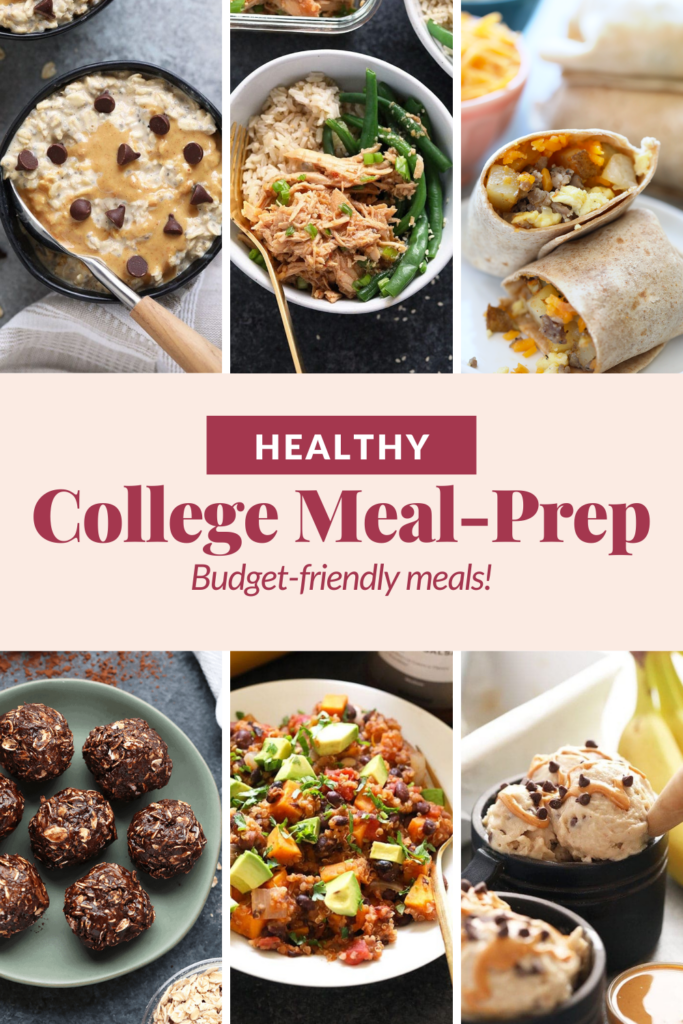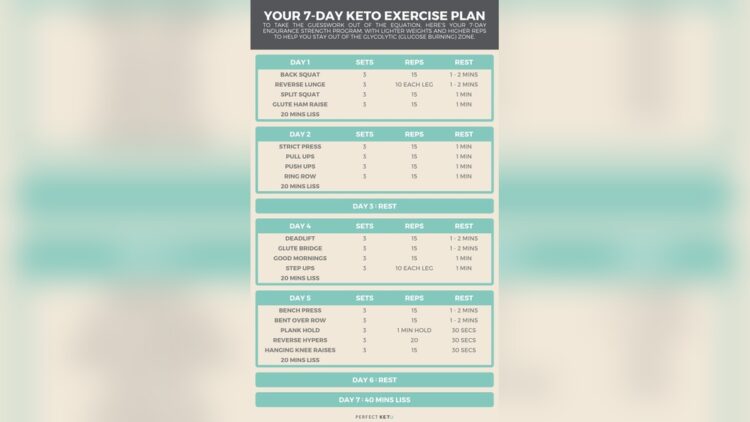Eating healthy in college can feel tough. Between classes, social life, and maybe even a part-time job, you might think there’s no time to focus on good food.
But what if you could make simple changes that fit your busy schedule? What if eating well didn’t mean giving up tasty meals or spending hours cooking? You’ll discover 10 easy ways to eat healthy in college without stress. These tips are designed to help you feel better, have more energy, and even save money.
Ready to take control of your health with simple steps? Keep reading—you’ll thank yourself later.

Credit: fitfoodiefinds.com
Plan Your Meals
Planning your meals helps you eat healthy and save time. It stops last-minute fast food trips. You will eat balanced meals with better nutrients. Planning reduces food waste and controls your budget. Start with simple steps to build a good habit.
Create A Weekly Menu
Write down meals for each day of the week. Include breakfast, lunch, dinner, and snacks. Choose easy recipes with healthy ingredients. Think about what you enjoy eating. Make sure meals have protein, vegetables, and whole grains. Planning ahead helps avoid unhealthy choices.
Shop With A List
Make a shopping list from your weekly menu. Buy only what is on the list. This stops impulse buys and junk food. Check your kitchen first to avoid duplicates. Stick to fresh fruits, vegetables, lean meats, and whole grains. Shopping with a list saves money and supports your meal plan.
Choose Nutritious Snacks
Choosing nutritious snacks helps keep energy up during busy college days. Snacks fuel the brain and body between meals. Healthy snacks prevent overeating later and support good focus. Pick snacks rich in vitamins, fiber, and protein. These keep hunger away longer. Avoid snacks with lots of sugar or empty calories. Smart snacking makes a big difference for overall health.
Healthy On-the-go Options
Easy snacks fit in a backpack or pocket. Fresh fruit like apples or bananas works well. Nuts and seeds offer protein and healthy fats. Yogurt cups or cheese sticks keep you full. Whole grain crackers pair nicely with hummus. Pre-cut veggies like carrots or cucumber are crisp and fresh. These choices stay fresh without much prep. Perfect for quick breaks or classes between.
Avoid Processed Snacks
Processed snacks often contain added sugar and salt. Potato chips, candy, and cookies give quick energy but crash later. They lack important nutrients and fiber. Avoid snacks with many ingredients you cannot pronounce. Choose whole foods or minimally processed options instead. This helps maintain steady energy and good digestion. Eating clean snacks supports long-term health and study success.
Cook Simple Recipes
Cooking simple recipes saves time and money. It helps you eat healthy without stress. Simple meals need few ingredients and little skill. They fit well with a busy college life. Learning easy cooking tricks makes eating better easier.
One-pot Meals
One-pot meals cut down on dishes and cleanup. You can cook rice, vegetables, and protein all together. This method keeps flavors rich and food tasty. Try soups, stews, or pasta dishes in one pot. It saves time and uses fewer kitchen tools.
Batch Cooking Tips
Batch cooking means making food in large amounts. Cook once, eat many times. Store meals in containers for quick use later. Freeze portions to keep food fresh longer. Prepare simple dishes like chili, rice, or roasted vegetables. This saves time and helps avoid unhealthy fast food.
Stay Hydrated
Staying hydrated is one of the easiest ways to keep your body and mind healthy in college. Water helps you stay alert during long classes and keeps your energy up throughout the day. Drinking enough water also helps your body digest food and remove waste.
Many students forget to drink water and choose sugary drinks instead. This can cause tiredness and make it harder to focus. Carry a water bottle and sip often. Your body will thank you.
Benefits Of Water
Water keeps your skin clear and healthy. It helps your brain work better, so you can study well. Drinking water prevents headaches and helps your muscles work during exercise. It also controls your body temperature. Water has no calories, so it helps you maintain a healthy weight.
Limit Sugary Drinks
Sugary drinks like soda and energy drinks can cause weight gain. They also lead to sugar crashes, making you feel tired. These drinks can harm your teeth and cause cavities. Try to replace sugary drinks with water or herbal tea. This simple change can improve your health and energy levels.
Balance Your Plate
Balancing your plate is a smart way to eat healthy in college. It means filling your meal with different food groups. This helps your body get the nutrients it needs. A balanced plate keeps you full and gives you energy to study and play.
Include Protein
Protein is important for your muscles and body repair. Good sources are chicken, fish, eggs, beans, and nuts. Try to add some protein to every meal. It helps you feel full longer and supports your growth.
Add Fruits And Veggies
Fruits and vegetables give vitamins and minerals your body needs. They also have fiber, which helps your digestion. Fill half your plate with colorful fruits and veggies. Choose fresh, frozen, or canned options without added sugar or salt.
Manage Portion Sizes
Managing portion sizes helps control calorie intake without feeling hungry. It supports steady energy and better digestion. In college, this skill prevents overeating during busy days. Small changes create big health benefits.
Use Smaller Plates
Choose smaller plates for meals. They make portions look bigger than they are. This simple trick helps eat less without feeling deprived. It also reduces food waste and saves money. Your brain feels satisfied with smaller servings.
Listen To Your Hunger
Pay attention to real hunger signals. Eat when your stomach feels empty, not bored. Stop eating before you feel full. This habit avoids overeating and discomfort. It takes practice but improves your eating habits fast.
Limit Fast Food
Fast food is quick and easy, but it often lacks important nutrients. Eating too much fast food can lead to feeling tired and gaining weight. It can also increase the risk of health problems later. Limiting fast food helps keep your body strong and your mind sharp. Small changes make a big difference in your health during college.
Healthier Alternatives
Choose foods that give your body fuel and energy. Fresh fruits, vegetables, and whole grains work well. Try sandwiches with lean meats or beans instead of fried options. Yogurt and nuts make good snacks between classes. Drinking water or natural juices helps more than soda. These choices support better focus and mood.
Plan Ahead To Avoid Temptation
Prepare meals or snacks before going to class. Packing a lunch stops the need to buy fast food. Keep healthy snacks like nuts or fruit in your bag. This way, hunger does not lead to poor choices. Planning saves money and improves your diet. It is easier to eat healthy with a small plan.

Credit: www.budgetbytes.com
Read Nutrition Labels
Reading nutrition labels helps you make smart food choices in college. These labels show important details about what is inside packaged foods. Knowing how to read them can keep your meals healthy and balanced.
Nutrition labels list calories, fats, sugars, and vitamins. Paying attention to these details helps you avoid unhealthy ingredients. It also guides you to eat the right amounts of nutrients.
Spot Hidden Sugars
Many foods have added sugars that are not easy to see. Look for words like “syrup,” “maltose,” “dextrose,” or “fructose” on the label. These mean sugar is added, even if the food seems healthy.
Too much sugar can cause energy crashes and weight gain. Choose foods with little or no added sugar for better health and steady energy.
Check Serving Sizes
Serving sizes on labels show how much food the nutrition facts cover. Sometimes, a package has more than one serving inside. Eating more than one serving means you get extra calories and nutrients.
Compare the serving size to what you actually eat. This helps avoid eating too many calories or fats without knowing it.
Find Support
Eating healthy in college can feel hard alone. Finding support helps you stay on track and enjoy your food choices. Friends and groups make healthy eating fun and less stressful. Sharing meals and tips creates a positive habit. It also motivates you to keep going, even on busy days.
Join Healthy Eating Groups
Many colleges have clubs focused on health and nutrition. Join these groups to meet others who care about eating well. They often share recipes, plan events, and offer advice. Being part of a group keeps you inspired and accountable. You learn new ideas and discover simple meals to try.
Cook With Friends
Cooking with friends makes meals more enjoyable. You can share tasks and try new recipes together. It’s cheaper and healthier than eating out alone. Friends can teach you cooking skills and help pick fresh ingredients. Cooking in groups builds habits that last beyond college life.

Credit: www.nytimes.com
Stay Consistent
Staying consistent is key to eating healthy in college. Small daily habits build lasting change. It helps your body adjust and keeps your energy steady. Consistency reduces stress about food choices. It makes healthy eating feel natural over time.
Focus on steady progress instead of quick fixes. This keeps motivation strong. Consistency also helps avoid unhealthy cravings and mood swings. Plan simple steps to follow every day. This way, healthy eating becomes part of your routine.
Set Realistic Goals
Set goals you can easily reach. Choose small changes like adding one fruit daily. Avoid aiming for big changes all at once. Realistic goals keep you motivated and prevent frustration. Write your goals down to remind yourself. Change your goals as you improve. This helps keep your healthy habits steady and doable.
Track Your Progress
Keep a simple food journal or use an app. Note what you eat and how you feel. Tracking helps you see your good habits and areas to improve. It also shows progress over time, which boosts motivation. Review your notes weekly to stay on track. Tracking makes your healthy eating clear and rewarding.
Frequently Asked Questions
What Are Simple Healthy Snacks For College Students?
Choose fruits, nuts, yogurt, or whole-grain crackers for quick, nutritious snacks on the go.
How Can I Eat Healthy On A Tight College Budget?
Buy seasonal produce, cook at home, and buy in bulk to save money and eat well.
What Are Easy Healthy Meals For Busy College Days?
Prepare salads, sandwiches, or stir-fries with fresh veggies and lean proteins for fast meals.
How Much Water Should College Students Drink Daily?
Aim for about 8 cups of water each day to stay hydrated and focused.
Conclusion
Eating healthy in college does not have to be hard. Small changes can make a big difference. Plan meals, choose fresh foods, and avoid junk snacks. Drink plenty of water and cook simple dishes. These habits help keep energy and focus high.
Staying healthy supports both body and mind. Start today with one easy step. Healthy eating becomes natural over time. Your college journey will feel better and more balanced. Keep trying and enjoy the positive changes.









Leave a Reply